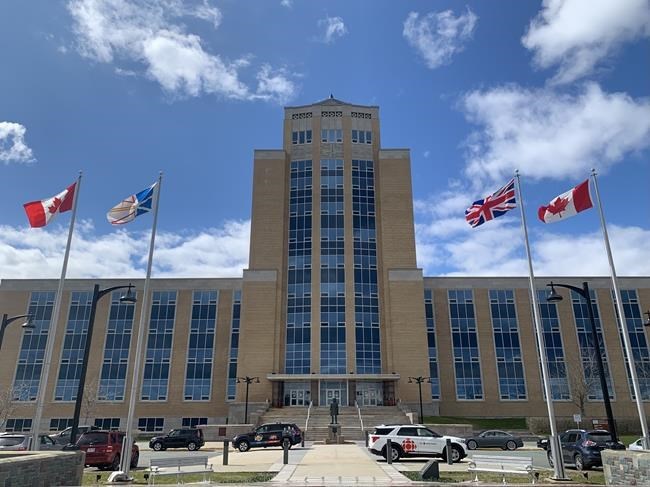
Newfoundland and Labrador Minister of Indigenous Affairs and Reconciliation Lisa Dempster told reporters in the provincial legislature, shown here in St. John's on Thursday April 29, 2021, that the decision to halt the renaming plan for Red Indian Lake came from the government and the province's five Indigenous leaders. THE CANADIAN PRESS/Sarah Smellie
Republished April 29, 2021 - 2:22 PM
Original Publication Date April 29, 2021 - 10:16 AM
ST. JOHN'S, N.L. - The Newfoundland and Labrador government is walking back its plan to rename Red Indian Lake following an uproar from nearby residents who said they weren't consulted and don't agree with the new Mi'kmaq name.
The provincial Office of Indigenous Affairs and Reconciliation issued a joint statement Thursday from Premier Andrew Furey and the province's five Indigenous leaders saying the government will "pause and reflect" on the naming of the lake and offer residents a chance to have their say.
Indigenous Affairs Minister Lisa Dempster said the statement's signatories arrived at a "unanimous consensus" Wednesday to halt the plans after she shared some of the public feedback with the Indigenous leaders.
"I understand people's attachment to place, I understand the emotion," Dempster told reporters Thursday. "I think what we need to understand here is Red Indian Lake is no longer an acceptable name, and whatever that next step is, we will find out in the coming weeks."
Red Indian Lake sits in the central interior of Newfoundland, about 530 kilometres northwest of St. John's, at the end of a long, two-lane road that connects the towns of Buchans, Millertown and Buchans Junction. Collectively, they're home to about 795 people.
Before those towns were settled, the Beothuk people hunted and overwintered on the shores of the lake, according to the Heritage Newfoundland and Labrador website. Among the island's original inhabitants, the last Beothuk is believed to have died in 1829. Last year, the remains of two Beothuk people, Nonosabasut and Demasduit, were returned to the province from Scotland after they were exhumed from a grave site on the island almost two centuries ago.
Dempster said Thursday that Red Indian Lake is being "seriously considered" as the final resting place for Nonosabasut and Demasduit. "There was consensus among the Indigenous leaders that the name was not appropriate," Dempster said. "It's derogatory, it's colonialism, and that name would have to change."
Dempster introduced a motion last week to rename the lake Wantaqo'ti Qospem, which means "peaceful lake" in the Mi'kmaq language.
She said the province's five Indigenous leaders — Nunatsiavut Government President Johannes Lampe, Innu Nation Grand Chief Etienne Rich, NunatuKavut Community Council President Todd Russell, Miawpukek First Nation Chief Mi’sel Joe and Qalipu First Nation Chief Brendan Mitchell — are the "voice" for the remains in the ongoing discussions about where they will rest, and they had agreed on the new name.
Her motion prompted Derm Corbett, mayor of Buchans, to write a public letter to the government saying his community was "disrespected and ignored" by the decision.
"Our little town is a gunshot from the lake itself," Corbett said in an interview Thursday. "It's been a part of the life of generations of people who've lived here." Residents were angry they weren't consulted, and they felt "peaceful lake" didn't say enough about the area's Beothuk heritage. "If you're interested in preserving Beothuk culture and Beothuk history, then pick something that has that tone to it."
Corbett said he feels residents of Buchans, Millertown and Buchans Junction deserve a say because of their history with the lake. He said there are Indigenous people in those towns who were also unimpressed with the new name.
Dempster said she expects the consultations with local residents to take two or three weeks. As part of its reconciliation efforts, the province will be reviewing more place names and monuments, she said, and she anticipates every one of those reviews to stir up emotion.
"If you don't want any controversy, do nothing," she said.
This report by The Canadian Press was first published April 29, 2021.
News from © The Canadian Press, 2021